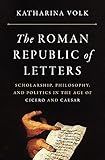The Roman Republic of Letters : Scholarship, Philosophy, and Politics in the Age of Cicero and Caesar / Katharina Volk.
Material type: TextPublisher: Princeton, NJ : Princeton University Press, [2021]Copyright date: ©2021Description: 1 online resource (400 p.)Content type:
TextPublisher: Princeton, NJ : Princeton University Press, [2021]Copyright date: ©2021Description: 1 online resource (400 p.)Content type: - 9780691224343
- 937/.03 23
- DG254.2
- DG254.2
- online - DeGruyter
| Item type | Current library | Call number | URL | Status | Notes | Barcode | |
|---|---|---|---|---|---|---|---|
 eBook
eBook
|
Biblioteca "Angelicum" Pont. Univ. S.Tommaso d'Aquino Nuvola online | online - DeGruyter (Browse shelf(Opens below)) | Online access | Not for loan (Accesso limitato) | Accesso per gli utenti autorizzati / Access for authorized users | (dgr)9780691224343 |
Frontmatter -- Contents -- Preface -- Abbreviations -- 1 Introduction -- 2 Respublica of Letters -- 3 Engaged Philosophy -- 4 Philosophy after Pharsalus -- 5 The Invention of Rome -- 6 Coopting the Cosmos -- 7 Conclusion -- Bibliography -- Index locorum -- General Index
restricted access online access with authorization star
http://purl.org/coar/access_right/c_16ec
An intellectual history of the late Roman Republic—and the senators who fought both scholarly debates and a civil warIn The Roman Republic of Letters, Katharina Volk explores a fascinating chapter of intellectual history, focusing on the literary senators of the mid-first century BCE who came to blows over the future of Rome even as they debated philosophy, history, political theory, linguistics, science, and religion.It was a period of intense cultural flourishing and extreme political unrest—and the agents of each were very often the same people. Members of the senatorial class, including Cicero, Caesar, Brutus, Cassius, Cato, Varro, and Nigidius Figulus, contributed greatly to the development of Roman scholarship and engaged in a lively and often polemical exchange with one another. These men were also crucially involved in the tumultuous events that brought about the collapse of the Republic, and they ended up on opposite sides in the civil war between Caesar and Pompey in the early 40s. Volk treats the intellectual and political activities of these “senator scholars” as two sides of the same coin, exploring how scholarship and statesmanship mutually informed one another—and how the acquisition, organization, and diffusion of knowledge was bound up with the question of what it meant to be a Roman in a time of crisis.By revealing how first-century Rome’s remarkable “republic of letters” was connected to the fight over the actual res publica, Volk’s riveting account captures the complexity of this pivotal period.
Mode of access: Internet via World Wide Web.
In English.
Description based on online resource; title from PDF title page (publisher's Web site, viewed 01. Dez 2022)


